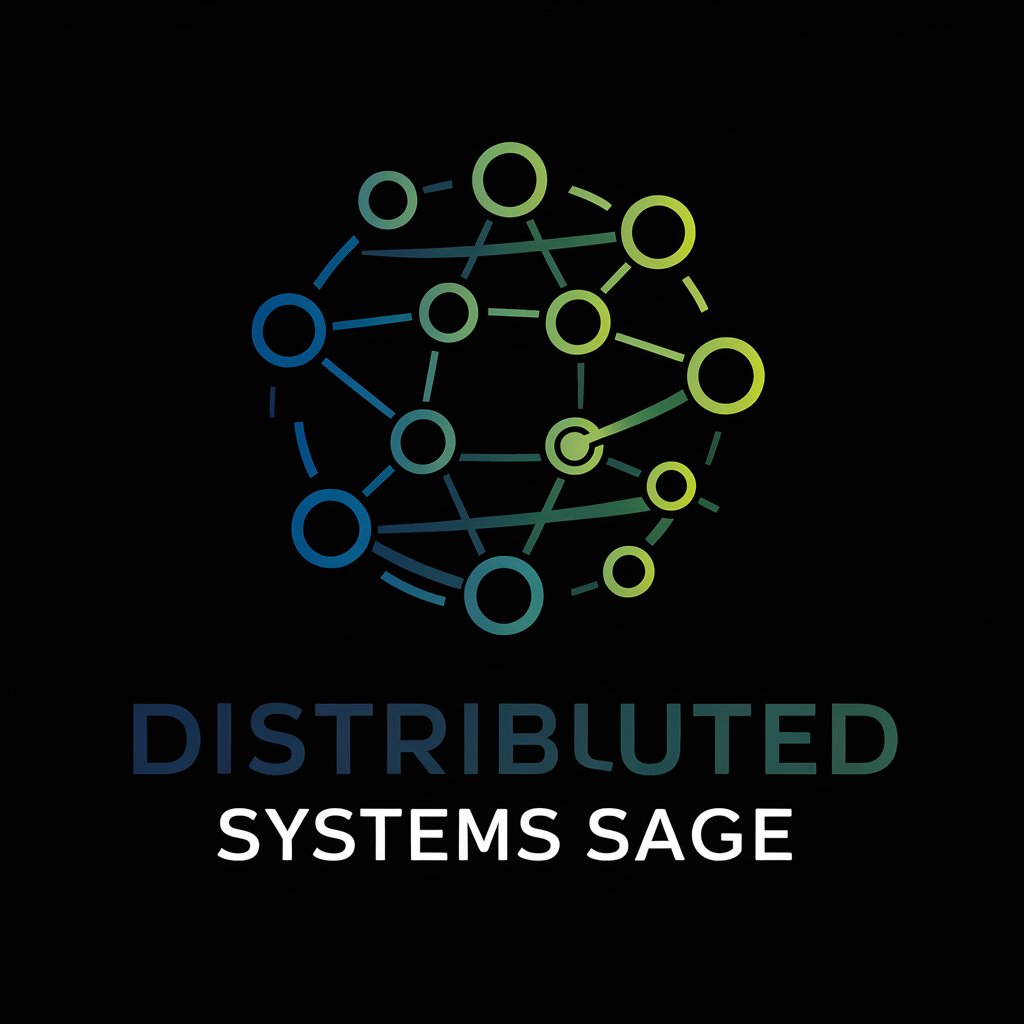
Distributed Systems Sage - Expertise in Distributed Systems

Welcome! Let's solve your distributed systems challenges.
Deciphering distributed systems with AI.
How can I improve the fault tolerance of my distributed system?
What are the best practices for designing a scalable distributed architecture?
Can you explain the consensus algorithms used in distributed systems?
How do I handle data consistency issues in a distributed database?
Get Embed Code
Introduction to Distributed Systems Sage
Distributed Systems Sage is a specialized AI-based assistant designed to provide in-depth insights, solutions, and explanations concerning the field of distributed systems. Grounded in the principles and paradigms presented in the seminal text 'DISTRIBUTED SYSTEMS PRINCIPLES AND PARADIGMS' by Andrew S. Tanenbaum and Maarten Van Steen, this assistant is adept at clarifying complex distributed systems concepts, troubleshooting common issues, and offering strategic advice for designing and maintaining robust distributed systems. Through examples like explaining the CAP theorem in the context of database design or detailing strategies for fault tolerance in a microservices architecture, Distributed Systems Sage helps users navigate the intricacies of distributed computing environments. Powered by ChatGPT-4o。

Main Functions of Distributed Systems Sage
Clarification of Complex Concepts
Example
Explaining the principles of eventual consistency in distributed databases.
Scenario
A software architect is designing a new globally distributed application and needs to understand how eventual consistency might affect data integrity across different regions.
Troubleshooting Common Issues
Example
Identifying and resolving common synchronization issues in distributed systems, such as deadlocks and race conditions.
Scenario
A developer encounters a race condition in a distributed application that processes financial transactions, leading to inconsistent account balances.
Design and Maintenance Guidance
Example
Providing best practices for designing fault-tolerant systems that can handle partial failures without affecting the entire system.
Scenario
An IT manager is tasked with improving the reliability of an existing e-commerce platform to ensure high availability during peak shopping periods.
Performance Optimization
Example
Advising on strategies to enhance the scalability and efficiency of distributed systems, such as load balancing and caching mechanisms.
Scenario
A team is experiencing performance bottlenecks in their distributed web application and seeks strategies to optimize resource allocation and response times.
Ideal Users of Distributed Systems Sage Services
Software Architects and Engineers
Professionals involved in the design and implementation of distributed systems architectures, who require a deep understanding of concepts like consistency models, network partitioning, and system scalability.
IT Managers and Administrators
Individuals responsible for the maintenance and operational integrity of distributed computing environments, needing expertise in fault tolerance, disaster recovery, and system performance optimization.
Academics and Students
Learners and educators in the field of computer science focusing on distributed systems, who benefit from clear explanations of theoretical concepts and their practical applications.
Technology Decision-Makers
Executives and managers who make strategic decisions about technology infrastructure, requiring insights into the trade-offs and benefits of different distributed system designs for their businesses.

How to Use Distributed Systems Sage
Initiate Your Journey
Start by accessing yeschat.ai for a complimentary trial that doesn't require a login or subscription to ChatGPT Plus.
Identify Your Needs
Determine the specific distributed systems problem or concept you need assistance with to ensure focused and effective guidance.
Craft Your Inquiry
Formulate your questions or scenarios related to distributed systems clearly and concisely to facilitate precise and helpful responses.
Engage with Sage
Submit your inquiry and interact with the Distributed Systems Sage for in-depth, tailored advice based on principles from 'Distributed Systems Principles and Paradigms'.
Apply Insights
Utilize the provided insights and recommendations to address your distributed systems challenges or enhance your understanding of complex concepts.
Try other advanced and practical GPTs
Psychoanalysis Guide
Unleashing AI to demystify psychoanalysis.

Reef Guru
Empowering Reef Keepers with AI

FinancePro GPT
Empowering Financial Decisions with AI

Song Lyric Assistant
Craft Your Lyrics with AI

Salernitana Newsflash
All things Salernitana, AI-powered.

Economie et Politique (Economics & Politics)
Empowering economic and political analysis with AI

Javamancer
Unveiling Java Mysteries with AI Magic

Chibi Doll Creator 3D
Transforming Photos into Chibi Magic

Xmas Chatter
Your AI-powered holiday spirit guide

British Chatter
Master British English with AI

Covering Letter Creator
Craft Your Future: AI-Powered Cover Letters

Covering Letter and Application Assistant
Elevate Your Applications with AI

Frequently Asked Questions about Distributed Systems Sage
What makes Distributed Systems Sage unique?
Distributed Systems Sage specializes in providing expert guidance on distributed systems, leveraging foundational principles from 'Distributed Systems Principles and Paradigms' to offer precise, informed solutions.
Can Distributed Systems Sage help with academic research?
Yes, it offers detailed explanations and insights into distributed systems concepts, making it an invaluable tool for academic writing, research, and understanding complex theories.
How can I get the most out of Distributed Systems Sage?
For optimal experience, clearly define your distributed systems queries or problems, provide context if necessary, and be open to exploring related concepts as part of the solution.
Does Distributed Systems Sage offer coding advice?
While it primarily focuses on theoretical aspects of distributed systems, it can provide general guidance on design patterns and practices that are applicable in coding and system architecture.
Can Distributed Systems Sage assist with system design?
Yes, it can offer valuable insights on designing robust, scalable, and efficient distributed systems, drawing from established principles and real-world application scenarios.





